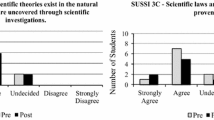Abstract
This paper reviews three pioneer programs that attempt to integrate genetic science and ethics in the classroom. The critical discussion focuses on what counts for ethics in each of these programs, on the corresponding theoretical framework represented in each, and on the success of each program in integrating science and ethics. It concludes by suggesting that the basic goal of integrating science and ethics is undermined in each program by a lack of correspondence between the articulated pedagogical goals and the unarticulated theoretical framework. In each case the unexamined framework gives epistemological privilege to science and undercuts the veracity of ethics. The constructive discussion suggests a theoretical framework that corresponds with the pedagogical goal of integrating ethics and genetic science in the classroom.
Similar content being viewed by others
References
Barman, C.R. and Hendrix, J.R.: 1983, ‘Exploring Bioethical Issues: An Instructional Model’, American Biology Teacher 45(1, 23–31.
Beauchamp, T.L. and Childress, J.F.: 1989, Principles of Biomedical Ethics, 3rd ed., Oxford University Press, New York.
BSCS (Biological Science Curriculum Study): 1992, Mapping and Sequencing the Human Genome: Science, Ethics and Public Policy, BSCS, Colorado Springs, CO.
Dewey, J.: 1939, ‘Theory of Valuation’, International Encyclopedia of Unified Science 11(1, 1–67.
Dewey, J.: 1948, Reconstruction in Philosophy, The Beacon Press, Boston.
Edel, A.: 1988, ‘The Concept of Values and Its Travels in Twentieth-Century America’, in M. G. Murphey and I. Berg (eds.), Values and Value Theory in Twentieth-Century America, Temple University Press, Philadelphia.
Feyerabend, P.: 1975, Against Method, New Left Books, London.
Haan, N., Aerts, E. and Cooper, B.A.B.: 1985, On Moral Ground: The Search for Practical Morality, New York University Press, New York.
Harding, S., ed.: 1993, The Racial Economy of Science, University of Indiana Press, Bloomington.
Harding, S.: 1986, The Science Question in Feminism, Cornell University Press, Ithaca.
Hendrix, J.R.: 1991, ‘Project GENETHICS: Mentor Teachers Implementing Validated Model Workshops in Human Genetics and Related Societal Issues’, xeroxed report distributed at the Biotechnology Education Conference, University of Wisconsin, Madison, November, 1991.
Hendrix, J.R.: 1980, ‘Bioethical Value-Clarifying, Decision-Making Model Response Sheet’, xerox copy distributed by a Ball State trainer during a workshop for San Francisco State University, August, 1992.
Keller, E.F.: 1992, Secrets of Life — Secrets of Death: Essays on Language, Gender and Science, Routledge, New York.
Keller, E.F.: 1985, Reflections on Gender and Science, Princeton University Press, New Haven.
Keller, E.F.: 1983, A Feeling for the Organism, W. H. Freeman, New York.
Kuhn, T.: 1962, The Structure of Scientific Revolutions, University of Chicago Press, Chicago.
Lakatos, I.: 1970, ‘Falsification and the Methodology of Scientific Research Programs’, in I. Lakatos and A. Musgrave (eds.), Criticism and the Growth of Knowledge, Cambridge University Press, Cambridge.
MacIntyre, A.: 1981, After Virtue, University of Notre Dame Press, Notre Dame, IN.
Mertens, T.R. & Hendrix, J.R.: 1990, ‘The Popular Press, Scientific Literacy, and Bioethical Decision-Making’, School Science and Mathematics 90(4, 317–322.
Midgley, M.: 1985, Evolution as Religion, Methuen, London.
Noddings, N.: 1992, The Challenge to Care in Schools: An Alternative Approach to Education, Teachers College Press, New York.
Noddings, N.: 1984, Caring, A Feminist Approach to Ethics & Moral Education, University of California Press, Berkeley, CA.
Poorman, M.: 1993, Interactional Morality, Georgetown University Press, Washington, D.C.
Raths, L.E., Harmin, M. & Simon, S.B.: 1966, Values and Teaching: Working With Values in the Classroom, Charles E. Merrill, Columbus, OH.
Rutherford, F.J. & Ahlgren, A.: 1990, Science for All Americans, Oxford University Press, New York.
SFSU (San Francisco State University, Department of Biology): 1990, ‘Summary Report '90’, a 2 page public information report of the Teacher Education in Biology (TEB) program.
Snow, C.P.: 1963, The Two Cultures and a Second Look, Cambridge University Press, New York.
Sullivan, E. V.: 1977, ‘A Study of Kohlberg's Structural Theory of Moral Development: a Critique of Liberal Social Science Ideology’, Human Development 20, 352–376.
Tiles, J.E.: 1988, Dewey, Routledge, New York.
Author information
Authors and Affiliations
Rights and permissions
About this article
Cite this article
Blake, D.D. Revolution, revision or reversal: Genetics — Ethics curriculum. Sci Educ 3, 373–391 (1994). https://doi.org/10.1007/BF00488453
Issue Date:
DOI: https://doi.org/10.1007/BF00488453




